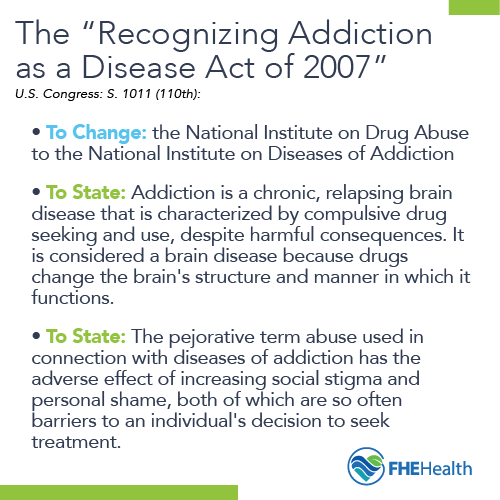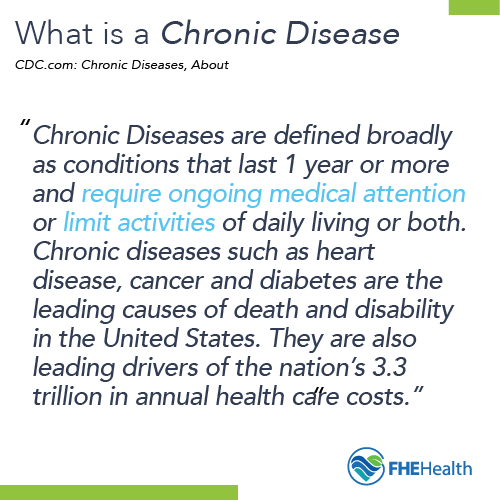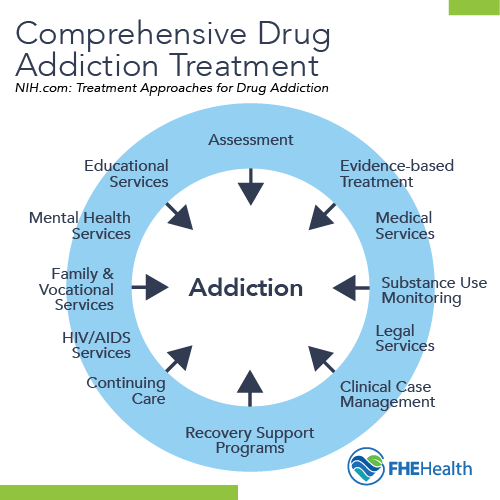What is the Medical Definition of a Disease?
A disease is defined as a health condition affecting the homeostasis of a human being. Diseases can be caused by pathogens such as infectious bacteria or viruses. Diseases may also emerge due to internal disruptions affecting one or more body systems, such as heart disease affecting the cardiovascular system or diabetes affecting blood glucose levels. Reasons for most chronic diseases (or diseases lasting longer than six months) involve lifestyle choices and/or genetics.
Is Drug Addiction a Disease?
 Just a little over a decade ago, Senator Joe Biden introduced the Recognizing Addiction as a Disease Act of 2007. Biden proposed rewriting language commonly used by lawmakers and the government when discussing addiction. For example, Biden wanted to rename NIDA (National Institute on Drug Abuse) as the National Institute on Diseases of Addiction and the NIAA (National Institute on Alcohol Abuse) as the National Institute on Alcohol Disorders and Health.
Just a little over a decade ago, Senator Joe Biden introduced the Recognizing Addiction as a Disease Act of 2007. Biden proposed rewriting language commonly used by lawmakers and the government when discussing addiction. For example, Biden wanted to rename NIDA (National Institute on Drug Abuse) as the National Institute on Diseases of Addiction and the NIAA (National Institute on Alcohol Abuse) as the National Institute on Alcohol Disorders and Health.
Addiction as a Disease, Not a Choice
So, is drug addiction a disease? The answer is yes. Senator Biden came to the conclusion that addiction should be seen as a disease instead of a “choice” after talking to many medical doctors, psychiatrists and neuroscientists. “Addiction should be considered a neurobiological disease, not a lifestyle choice”, Biden argued. “We need to start changing the way addiction is perceived to help us move past the overwhelming social stigma associated with the disease of addiction.” This bill died in Congress due to a combination of issues, notably that it could be construed as the government inserting itself into declaring what is scientific truth and what language we use. The bill, even if it didn’t pass, does, however, act as a landmark of consensus among leaders and the community.
The Hard Science of Addiction
According to the National Institutes of Health, “addiction is now understood to be a brain disease due to scientific research showing that drugs and alcohol actually change brain function and structure.” The NIH further reports that the advancement of brain imaging technology has made it possible to peer deep inside the brain of an addict and see exactly how areas of the brain are impacted by addictive drugs.
Drugs and alcohol severely disrupt chemical and neuronal activity in the brain. Just like people with diabetes or high cholesterol need medication to prevent their disease from worsening, addicts need medications to help eliminate cravings for drugs so that brain functioning can return to normal. Unless the disease of addiction is treated with medications, an addiction continues to negatively influence a person’s thinking patterns and behaviors.
Drugs and alcohol have powerful effects on the brain’s reward system. Addictive substances also affect areas of the brain outside the reward “pathway”, especially areas controlling logical thinking, judgment, and decision-making. Physical changes caused by drugs involve the reduction of neuronal activity in one brain region and the promotion of undesired brain cell “connections” in another. Once these changes have been made in the brain, cravings for drugs and alcohol develop into almost instinctual compulsions. Addiction is a medical problem, not a will-power problem.

Why Addiction is Still Viewed as a “Choice” By Much of Society
The consensus of the professional medical community is that addiction is indeed a disease of the body and brain and not a mental disorder or lifestyle choice. However, underlying discriminatory attitudes against addicts still prevail in society. Long-standing beliefs about addicts emerged hundreds of years ago before we had the technology to fully understand the brain and how it reacts to addictive substances. Instead, people saw only the external behavior of addicts and assumed they could simply “stop” using drugs if they wanted to. For someone who hasn’t dealt with addiction, it’s difficult to comprehend the inability to control an action. This, coupled with an unfortunately common desire to judge others means it’s easy to accept that they are simply ‘weaker’.
Fortunately, as research continues investigating the neurobiological foundations of addiction, society is gradually understanding that addiction should not be stigmatized, but treated as a chronic disease that requires ongoing medical and psychological attention by trained professionals.
Addiction as a Chronic Disease
 There is further value in understanding addiction as a chronic disease, a condition that persists after drug abuse treatment. A chronic disease must be continually kept in check. When an addict relapses after abstaining from drug use for an extended period of time, this relapse is no different than a diabetic, high blood pressure or heart disease patient not taking their medications as prescribed and having a heart attack. In other words, an addict who relapses is not someone who wished to continue using drugs. This simply means that the medications and/or treatment program needs to be readjusted or replaced with another treatment plan.
There is further value in understanding addiction as a chronic disease, a condition that persists after drug abuse treatment. A chronic disease must be continually kept in check. When an addict relapses after abstaining from drug use for an extended period of time, this relapse is no different than a diabetic, high blood pressure or heart disease patient not taking their medications as prescribed and having a heart attack. In other words, an addict who relapses is not someone who wished to continue using drugs. This simply means that the medications and/or treatment program needs to be readjusted or replaced with another treatment plan.
Addiction is, in fact, a more serious disease than many common chronic diseases. Ongoing research into the long-term damage drug and alcohol abuse has on the brain and body indicates these effects resemble damage suffered by people with a traumatic brain injury (TBI). Symptoms occurring as a result of TBI includes unconsciousness, convulsions, muscle weakness and serious cognitive problems. The health consequences of a TBI are sometimes permanent and visibly apparent in brain scans. Unfortunately, neurologists often see the same type of brain damage affecting addicts who have never had a traumatic brain injury.
The Medical Model of Substance Addiction
Concepts supporting the medical model of addiction include addiction as a disease involving imbalances of neurotransmitters and addiction as a genetically predisposed/biological disease. Moreover, drugs release dopamine and serotonin that play critical roles in the development of substance addiction. Genetic research into drug addicts have also found abnormalities on certain receptor genes for serotonin and dopamine. Doctors think these genetic markers may make certain people more vulnerable to addiction than others.
Under the medical model of addiction, the transition from using drugs recreationally to becoming addicted to drugs is clearly illustrated by profound changes to the brain initiated by drug abuse. For example, the inability for addicts to experience pleasure or satisfaction without consistently abusing drugs (hedonic dysregulation) contributes heavily to the progression from occasional use to chronic use.
“Addiction as a disease, and not a choice” endorses the clinically proven knowledge that neurotransmitter disruption, alterations in brain architecture and, to some extent, genetics cause addiction. However, understanding that addicts are suffering from a disease should not invalidate the need for individuals in an addiction treatment program to assume answerability for their actions while in recovery. Cognitive behavioral therapy and addiction counseling included in a comprehensive treatment program are designed to help addicts cope with situations that could “trigger” cravings, correct inappropriate thinking patterns and learn self-control strategies.

Medical Treatment of Addiction
Effective treatment of a drug addiction must start with the person entering a medically supervised detoxification program. “Detox” involves the use of medications to alleviate withdrawal symptoms and cravings while helping the body and brain adjust to being drug-free. In some cases, patients undergoing a medical detoxification may discover they have health issues (anemia, infections, malnutrition) resulting from a substance addiction. This is why substance abusers should never try to beat their addiction by going “cold turkey”. Severe withdrawal symptoms combined with medical problems could cause life-threatening symptoms requiring emergency treatment.
Advantages to Treating an Addiction with Medication
Just like people use medications to prevent chronic diseases from worsening, substance abusers also have some medications that can assist in their treatment. Many of these drugs target the same brain receptors targeted by addictive drugs. Unlike illegal drugs that stimulate brain receptors, most addiction medication suppresses receptor activity to reduce withdrawal symptoms and cravings. Additionally, addiction medications help patients regain their physical and mental wellness so they can benefit from psychotherapy and counseling as much as possible. There is much debate in the recovery community whether long-term use of these medications is ‘truly living drug-free’. Ideally, these medications are used short-term, but each person’s experience with the disease of addiction varies.
What We Believe
 Addiction, like all other diseases, begins at the molecular level and requires a specific personalized treatment plan that targets and modify these changes so that physiological processes can return to normal functioning. We believe that treating substance abuse as a medical issue not only strengthens a patient’s ability to experience successful recovery but also provides them with the healthy mind and body necessary to cope with the rehabilitation process.
Addiction, like all other diseases, begins at the molecular level and requires a specific personalized treatment plan that targets and modify these changes so that physiological processes can return to normal functioning. We believe that treating substance abuse as a medical issue not only strengthens a patient’s ability to experience successful recovery but also provides them with the healthy mind and body necessary to cope with the rehabilitation process.
Addiction is a complicated issue that requires the guidance of multiple addiction and medical professionals to help the person experience a successful recovery and a meaningful life. When addiction is viewed as a real disease rather than a personality flaw or lifestyle choice, it offers the addict the opportunity to embrace a healthy, objective perspective on the problem that will help them cope with stigma and improve their overall outlook.
Drug addiction is not a crime; it is a physical and mental illness from which no individual is immune. At FHE Health, patients suffering from a drug addiction are treated with compassion, respect and dignity. With the help of caring therapists, counselors and a medical staff qualified to treat physical problems associated with withdrawal and detoxification, patients seeking the kind of reward motivation and successful treatment for their addiction will find the guidance and comfort they require at FHE Health to begin living the satisfying life they have always wanted and deserve to feel good.








